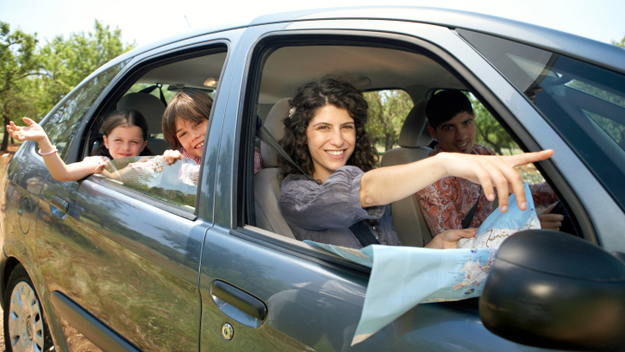How To Prepare For A Cross-Country Road Trip
 (credit: Thinkstock)
(credit: Thinkstock)
Summer is well past the halfway point and if you're still mulling over a cross-country trip before Labor Day, now is the time to really get serious. It doesn't matter if you're traveling with family or traveling solo, a coast-to-coast trip is one of the best ways to enjoy America's natural beauty and its hidden gems. But getting under way without some advance planning could make what was meant to be the trip of a lifetime into a trip you wish you'd never took, especially in a place you're unfamiliar with. To get you started on the right track to the best road trip ever, here are a few helpful tips for you to consider.
With nothing but the road ahead, some travelers may opt for a spontaneous journey across the country. But if this is your first extended road trip or you don't like surprises, you're bound to have a far better experience by creating an itinerary. You can start by picking up a map of the United States or simply viewing a map online. Whether you're looking at a digital or paper version, a map of the country will allow you to determine which route you'd like to travel and estimate the number of days it might take. Among the most popular routes are Interstate 80 that extends between downtown San Francisco and Teaneck, New Jersey, just west of Manhattan. While Google Maps can be a great resource for mapping your trip, an excellent map of the historic Lincoln Highway is also worth reviewing. Other recommended routes you can consider on a coast-to-coast trip include U.S. Route 50, Interstate 90 and Interstate 40, traveling along much of the iconic U.S. Route 66. Lastly, while you're preparing your itinerary, take some extra time to determine what attractions you'd like to see along the way and if any costs are involved.
Make Lodging Reservations In Advance
It doesn't matter if you're staying in a hotel or camping out, advance reservations can help you save money and lessen your risk of being greeted with a "No Vacancy" sign. Online travel sites like Expedia, Orbitz and Priceline are all excellent resources in which to book advanced reservations as well as travel search engine sites like Trivago, Hipmunk and Kayak that allow you to compare prices amongst competing sites. You can also receive a discount towards your lodging if you use a mobile device to book your trip through sites that include Expedia, Orbitz and Hotwire.If you want to camp out for part or all of your trip, Reserve America and Recreation.gov are among the great sites to begin your search. If you still insist on booking on the fly, any of the aforementioned travel sites offer last minute bargains in addition to top-rated last minute travel apps like HotelTonight and Last Minute Travel.
Like preparing an itinerary and making advanced lodging reservations, deciding upon a budget for the trip isn't mandatory. But if expenses get out of control, you'll eventually come home to some extra bills that can put a serious crimp on your finances. One of the most important expenses to factor in is gas for your vehicle. Say you decide to take your cross-country trip on Interstate 80, a length of 2,900 miles. If your vehicle averages 30 miles to a gallon on the highway you can estimate how many times you will need to fill up along the trip based upon the size of your gas tank. But that's just the start of calculating the expenses for your trip since meals, lodging and sightseeing must all be taken into account, along with some extra cash in case of an emergency.
Have Your Vehicle Serviced
Some of worst possible things that can happen on a road trip regardless of the length are to have an accident or experience car trouble. By taking your vehicle in for an inspection and servicing, you considerably lessen your risk of something going wrong. Among the services that should be performed in advance of the trip are checking the battery, checking for tire wear and proper inflation and checking fluids, filters and all of the vehicle's lights and signals. Yet in spite of performing all of the above, some travelers will still experience a malfunctioning vehicle. To make the experience less stressful, bring along emergency equipment such as flares, jumper cables, a flashlight with extra batteries and a first aid kit. If you have a smartphone, you can use it as a GPS in case you're lost or need additional directions. For example, the best and most widely used mobile app for navigation is Waze, which can help you with your route and alert you of road hazards like heavy traffic, accidents and stalled vehicles. Of course, it's also very important to ensure your smart phone is fully charged and to bring along a charger.
Stock Your Vehicle With Groceries
It may not be as entertaining as dining out, but buying groceries for your road trip will help you save a lot of money. Great food ideas include healthy snacks like carrot and celery sticks, trail mix, fresh fruit and low fat yogurt. With perishables, you'll definitely need to bring a cooler along with plenty of drinking water and other beverages of your choice, preferably healthy options such as ice tea, tomato juice with low sodium and coconut water. Items like utensils, paper towels, reusable cups and bowls should also be brought along regardless of whether you're camping or not.



